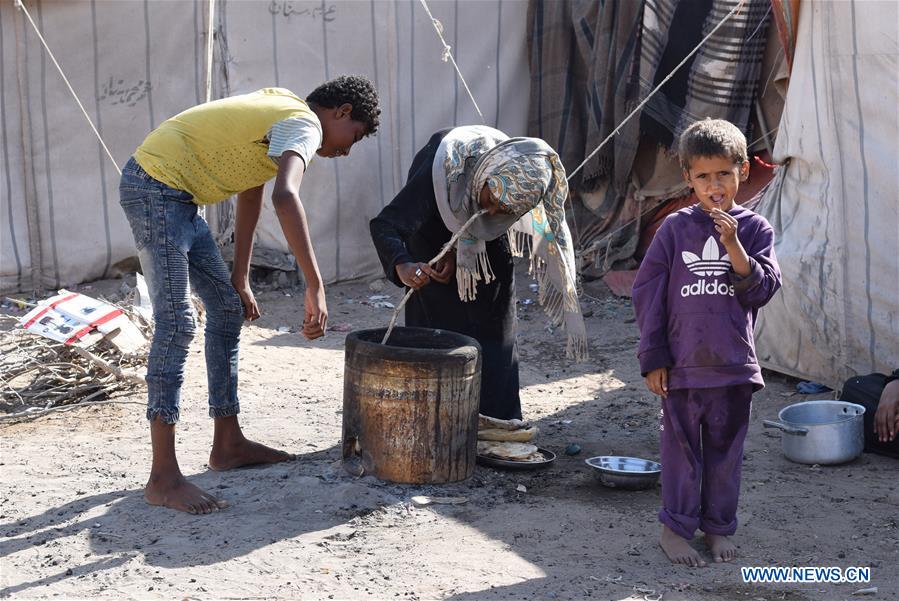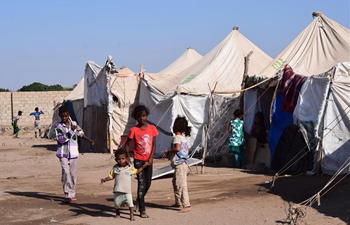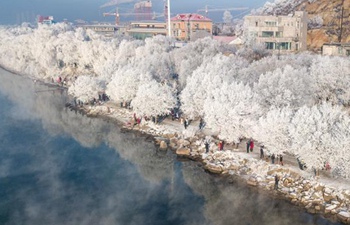 ?
?A girl cooks food outside her tent at a displacement camp on the outskirts of Aden, Yemen, on Dec. 14, 2018. Thousands of forcibly displaced Yemenis are seeking to return home as the country's internationally-backed government and the Houthi rebels agreed to a cease-fire in the Red Sea port city Hodeidah. (Xinhua/Murad Abdo)
by Murad Abdo
ADEN, Yemen, Dec. 14 (Xinhua) -- Thousands of forcibly displaced Yemenis are seeking to return home as the country's internationally-backed government and the Houthi rebels agreed to a cease-fire in the Red Sea port city Hodeidah.
The two-warring sides concluded week-long UN-sponsored peace talks in Sweden on Thursday with an agreement on cease-fire in the flashpoint city of Hodeidah, which is still held by the Houthi fighters.
At a press conference, UN Secretary-General Antonio Guterres said the Houthi rebel fighters and the government of Yemen agreed on a partial cease-fire in Yemen's Hodeidah, paving the way for the opening of humanitarian corridors.
The breakthrough also included deployment of neutral forces in Hodeidah following the withdrawal of the forces loyal to the warring factions which have agreed to meet again in late January.
Just a few hours after the announcement of the province-wide cease-fire deal, thousands of internally displaced people living in a camp outside the southern port city of Aden started preparations for the journey back to their homes in war-ravaged Hodeidah.
Faisal Hasoon, who has been living a difficult life in a small tent with his family members in a displacement camp for months, told Xinhua that Sweden's cease-fire deal on Hodeidah is an important victory for humanity and a great step to end the country's years-long suffering in the next months.
"I'm definitely happy about Sweden's deals, particularly the cease-fire in Hodeidah. It means a lot for us as displaced people in this camp or elsewhere," said Hasoon, a father of four.
He urged the warring factions to help facilitate the return of the displaced to their houses in Hodeidah and live there in peace.
Fatoom Haider, 70, told Xinhua that life in displacement camps has become more difficult than in their war-ravaged areas.
"Hodeidah is my city and I feel happy and live in dignity there. It's time to leave this place where we are spending our nights in suffering because of the cold weather," Fatoom said.
She thanked the Yemeni warring rivals for finally deciding to end the humanitarian catastrophe and agreeing on de-escalation.
However, some internally displaced people fear that their dreams will be demolished because the warring factions may backtrack on their promises to withdraw their forces from Hodeidah.
Ayman Ahmed, an internally displaced civilian from Hodeidah, told Xinhua that the time of returning home remains undetermined.
"It is difficult to believe the warring factions will withdraw from Hodeidah because they have never abided by political agreements. They were just deceiving the international community," Ahmed said.
"Returning to our houses is going to happen only if one of the warring factions defeated the other and otherwise it will be impossible," he added.
Observers also said the two-warring sides will not abide by the deals signed under the auspices of the UN in Sweden and may resume fighting more aggressively.
The latest peace talks tackled a wide range of substantive issues, with an aim to put Yemen back on the path of peace and alleviate the suffering of the Yemeni people.
The impoverished Arab country has been locked into a civil war since the Iran-backed Shiite Houthi rebels overran much of the country militarily and seized all northern provinces, including the capital Sanaa, in 2014.
Saudi Arabia leads an Arab military coalition that intervened in Yemen in 2015 to support the government of President Abd-Rabbu Mansour Hadi after Houthi rebels forced him into exile.
The internal military conflict between the Iranian-backed Houthis and the Saudi-backed Yemeni government has entered its fourth year, aggravating the suffering of Yemenis and deepening the already world's worst humanitarian crisis.















